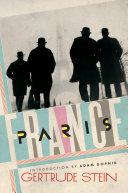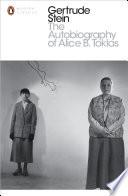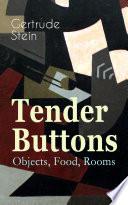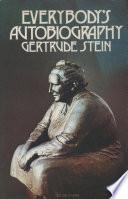Works

Paris France
Gertrude SteinThe Making of Americans
Gertrude Stein
The Autobiography of Alice B. Toklas
Gertrude SteinPicasso
Gertrude Stein
Tender buttons: objects, food, rooms
Gertrude SteinThree Lives
Gertrude Stein
Everybody's Autobiography
Gertrude SteinFamous Gertrude Stein Quotes
“We are always the same age inside.”
As quoted in The American Treasury, 1455-1955 (1955) edited by Clifton Fadiman, p. 946
Source: Everybody’s Autobiography (1937), Ch. 3
Context: Would I if I could by pushing a button would I kill five thousand Chinamen if I could save my brother from anything. Well I was very fond of my brother and I could completely imagine his suffering and I replied that five thousand Chinamen were something I could not imagine and so it was not interesting.
One has to remember that about imagination, that is when the world gets dull when everybody does not know what they can or what they cannot really imagine.
Gertrude Stein: Trending quotes
Source: Everybody’s Autobiography (1937), Ch. 2
Source: Paris France (1940), p. 103
Gertrude Stein Quotes
Source: Everybody’s Autobiography (1937), Ch. 2
Source: Everybody’s Autobiography (1937), Ch. 4
Context: Explanations are clear but since no one to whom a thing is explained can connect the explanations with what is really clear, therefore clear explanations are not clear. Now this is a simple thing that anybody who has ever argued or quarreled knows perfectly well is a simple thing, only when they read it they do not understand it because they do not see that understanding and believing are not the same thing.
“All of you young people who served in the war. You are a lost generation…”
Statement quoted by Ernest Hemingway in A Moveable Feast (1964) Ch. 3, it had also provided the epigraph to The Sun Also Rises (1926).
Context: All of you young people who served in the war. You are a lost generation... You have no respect for anything. You drink yourselves to death.
"A Circular Play," from Last Operas and Plays (1949) [written in 1920]
Context: A beauty is not suddenly in a circle. It comes with rapture. A great deal of beauty is rapture. A circle is a necessity. Otherwise you would see no one. We each have our circle.
“It always did bother me that the American public were more interested in me than in my work.”
Source: Everybody’s Autobiography (1937), Ch. 2
Context: It always did bother me that the American public were more interested in me than in my work. And after all there is no sense in it because if it were not for my work they would not be interested in me so why should they not be more interested in my work than in me. That is one of the things one has to worry about in America.
“From the very nature of progress, all ages must be transitional.”
"Form and Intelligibility," from The Radcliffe Manuscripts (1949); written in 1894 as an undergraduate at Radcliffe College
Context: From the very nature of progress, all ages must be transitional. If they were not, the world would be at a stand-still and death would speedily ensue. It is one of the tamest of platitudes but it is always introduced by a flourish of trumpets.
The Making of Americans (1925)
Context: There are many that I know and I know it. They are many that I know and they know it. They are all of them themselves and they repeat it and I hear it. Always I listen to it. Slowly I come to understand it. Many years I listened and did not know it. I heard it, I understood it some, I did not know I heard it. They repeat themselves now and I listen to it. Every way that they do it now I hear it. Now each time very slowly I come to understand it. Always it comes very slowly the completed understanding of it, the repeating each one does to tell it the whole history of the being in each one, always now I hear it. Always now slowly I understand it.
“Everybody gets so much information all day long that they lose their common sense.”
Reflections on the Atom Bomb (1946)
“In the morning there is meaning, in the evening there is feeling.”
Source: Tender Buttons
“Let me listen to me and not to them”
Stanzas in Meditation (1932) Stanza VII
Context: Let me listen to me and not to them
May I be very well and happy
May I be whichever they can thrive
Or just may they not.
They do not think not only only
But always with prefer
And therefore I like what is mine
For which not only willing but willingly
Because which it matters. They find it one in union.
In union there is strength.
“I do want to get rich but I never want to do what there is to do to get rich.”
Source: Everybody’s Autobiography (1937), Ch. 3
“For a very long time everybody refuses and then almost without a pause almost everybody accepts.”
Composition as Explanation (1926)
Context: For a very long time everybody refuses and then almost without a pause almost everybody accepts. In the history of the refused in the arts and literature the rapidity of the change is always startling.
Context: No one is ahead of his time, it is only that the particular variety of creating his time is the one that his contemporaries who are also creating their own time refuse to accept... For a very long time everybody refuses and then almost without a pause almost everybody accepts. In the history of the refused in the arts and literature the rapidity of the change is always startling.
Variant: Everybody knows if you are too careful you are so occupied in being careful that you are sure to stumble over something.
Source: Everybody’s Autobiography (1937), Ch.1
“America is my country and Paris is my home town and it is as it has come to be.”
An American and France (1936)
“You are extraordinary within your limits, but your limits are extraordinary!”
Source: Everybody's Autobiography
Source: Three Lives & Tender Buttons
Source: The Autobiography of Alice B. Toklas
“A writer should write with his eyes and a painter paint with his ears.”
What Are Masterpieces and Why Are There So Few of Them (1936), Afterword of a later edition
“I really do not know that anything has ever been more exciting than diagramming sentences.”
Source: Lectures in America
Source: The Autobiography of Alice B. Toklas
“What is the answer?" [ I was silent ] "In that case, what is the question?”
Last words (27 July 1946) as told by Alice B. Toklas in What Is Remembered (1963)
"How Writing is Written," Choate Literary Magazine (February 1935)
How Writing Is Written: Previously Uncollected Writings, vol.II (1974)
“It is awfully important to know what is and what is not your business.”
"What Is English Literature?" (1935)
“A real failure does not need an excuse. It is an end in itself.”
Four in America (1933)
The Geographical History of America (1936)
Four Saints in Three Acts (1927)
Operas and Plays (1932)
Source: Paris France (1940), p. 28
What Are Masterpieces and Why Are There So Few of Them (1936), Afterword of a later edition
